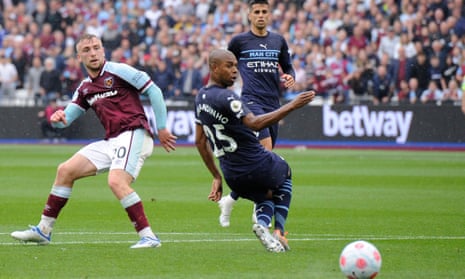
I was addicted to betting on football – a ban on ads on the front of shirts is nowhere near enough

You can see about 700 gambling ads in every Premier League game. Each one is a potential hook into a lifetime of addiction
In the depths of my gambling addiction, I hit a moment when I vowed to never gamble again and closed all my betting accounts. But then as I watched Match of the Day that evening, a new company was advertised in the hoardings, and I was straight back online placing a bet.
In fact, it was the wall-to-wall advertising around football that first drew me in at 16. It started at the bookies, but after signing up with the big brands online, I was soon sent daily “free spin” offers for the even more addictive online slots and casino games. When I started really losing, I was made a ”VIP customer” where – still on minimum wage – I was sent free Premier League tickets and other gifts. Over the next 12 years I lost every penny I could scrape together. But the money wasn’t even the biggest problem. Gambling turned a happy, bright and motivated young person into a broken, depressed and hopeless 28-year-old wreck. They didn’t show me that on the glossy adverts.
For the past five years I’ve been in recovery, and I’ve made it my mission to campaign to end gambling advertising in football. And this week’s news that Premier League clubs have agreed to withdraw gambling sponsorship from the front of shirts brings up mixed feelings.
The front of a Premier League shirt is the ultimate advertising space, seen by billions of people around the world, and worn by millions more. This allows gambling companies associated with immense social damage – with an estimated 1.44 million people addicted in the UK, and up to 496 yearly suicides in England alone – to become household names, completely normalising them. West Ham’s sponsor Betway, for instance, gets regular airtime via football shirts not just at matches, but also on the hit US comedy-drama Ted Lasso, as if it were as harmless as Marmite. This is the same company fined £400,000 for having links to gambling ads on the children’s colouring-in pages on West Ham’s website. Many gambling companies connected to football have received large fines for social responsibility failures, and MPs have called for an investigation into possible links between some clubs’ betting partners and an individual allegedly involved in organised crime.
But the front of a shirt is just a small part of the advertising onslaught that all football fans face. You’ll see about 700 gambling adverts, more than six a minute, if you watch an average Premier League game. They flash relentlessly across the hoardings, around the ground, not to mention appearing in the matchday programmes, across club websites and during TV and radio broadcasts. Every advert is a potential hook into a life of addiction for a child. Or for someone in recovery, like myself, to being thrust back into that hell.
So while removing the ads from shirts is a welcome first step, it is incoherent to leave all else untouched. The English Football league will still be named after a betting firm, and all the non-Premier League clubs, most notably Rangers and Celtic, are unaffected. The ads won’t even be removed from Premier League shirts: they’ll still be on sleeves. So there’s a long road to travel.
The move has come just ahead of the publication of a white paper expected to propose an overhaul of the 2005 Gambling Act, perhaps in the hope that this will be enough to head off any further government action.
Football is also due to get an independent regulator next year because it can’t self-regulate, so why should it be trusted to do the right thing with gambling?
Over the last few years, I’ve created and led a campaign – the Big Step – to kick gambling ads out of football. We’re a community of people who have been harmed by gambling – people in recovery from gambling addiction and others affected, including those who’ve lost family or friends to suicide. To draw attention to our campaign, we walk between football clubs, sometimes as much as 30 miles in a day, often for several days in a row.
And while our cause is popular among fans who, much like the wider public, don’t want their heroes to be billboards for online casinos, most clubs have been less welcoming. Two weeks ago, 50 of us walked through the rain to the three big north-east clubs, Newcastle, Sunderland and Middlesbrough, and no one even came out to meet us. This has been the case on every walk we’ve done. The few who will speak to us tell us that advertising has no impact on addiction, gaslighting those of us who have been through it.
I love football but I can’t trust the leagues on this issue; the government must now step in and go further. It would be a PR disaster if, after three years of reviewing the Gambling Act, it did nothing else to restrict gambling advertising and sponsorship in the upcoming white paper.
With this first step, it feels there’s now explicit recognition that gambling ads are unhealthy, unpopular and will inevitably one day be kicked out of football. But if it takes years to do it, a whole generation of young fans will be put at risk of a devastating addiction, as I was, and many may die. The nation is expecting much more than this, and soon.
-
James Grimes is head of education and the Big Step campaign for the charity Gambling with Lives (support@gamblingwithlives.org), which supports families bereaved by gambling-related suicide
-
In the UK and Ireland, Samaritans can be contacted on freephone 116 123, or email jo@samaritans.org or jo@samaritans.ie. In the US, the National Suicide Prevention Lifeline is at 988 or chat for support. You can also text HOME to 741741 to connect with a crisis text line counselor. In Australia, the crisis support service Lifeline is 13 11 14. Other international helplines can be found at befrienders.org
